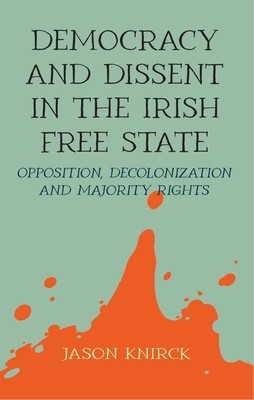
- We will send in 10–14 business days.
- Author: Jason Knirck
- Publisher: Manchester University Press
- ISBN-10: 1526166275
- ISBN-13: 9781526166272
- Format: 15.6 x 23.4 x 1.6 cm, kieti viršeliai
- Language: English
- SAVE -10% with code: EXTRA
Reviews
Description
A new analysis of the difficulties in normalising opposition in the Irish Free State, this book analyses the collision between nineteenth-century monolithic nationalist movements with the norms and expectations of multiparty parliamentary democracy. The Irish revolutionaries' attempts to create a Gaelic, postcolonial state involved resolving tension between these two ideas. Smaller economically-driven parties such as the Labour and Farmers' parties attempted to move on from the revolution's unnatural focus on nationalist political issues while the larger revolutionary parties descended from Sinn Féin attempt to recreate or restore notions of revolutionary unity. This conflict made democracy and opposition hard to establish in the Irish Free State.
EXTRA 10 % discount with code: EXTRA
The promotion ends in 21d.05:02:56
The discount code is valid when purchasing from 10 €. Discounts do not stack.
- Author: Jason Knirck
- Publisher: Manchester University Press
- ISBN-10: 1526166275
- ISBN-13: 9781526166272
- Format: 15.6 x 23.4 x 1.6 cm, kieti viršeliai
- Language: English English
A new analysis of the difficulties in normalising opposition in the Irish Free State, this book analyses the collision between nineteenth-century monolithic nationalist movements with the norms and expectations of multiparty parliamentary democracy. The Irish revolutionaries' attempts to create a Gaelic, postcolonial state involved resolving tension between these two ideas. Smaller economically-driven parties such as the Labour and Farmers' parties attempted to move on from the revolution's unnatural focus on nationalist political issues while the larger revolutionary parties descended from Sinn Féin attempt to recreate or restore notions of revolutionary unity. This conflict made democracy and opposition hard to establish in the Irish Free State.


Reviews